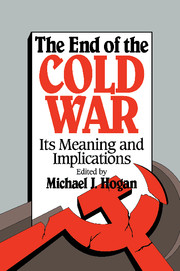Book contents
- Frontmatter
- Contents
- Preface
- The Authors
- Dedication
- 1 Introduction
- 2 An End to Which Cold War?
- 3 The Cold War, the Long Peace, and the Future
- 4 Quiet Cataclysm: Some Afterthoughts on World War III
- 5 Some Lessons from the Cold War
- 6 Nuclear Weapons and European Security during the Cold War
- 7 Victory in the Postwar Era: Despite the Cold War or Because of It?
- 8 The Wicked Witch of the West is Dead. Long Live the Wicked Witch of the East
- 9 The End and the Begining
- 10 A Balance Sheet: Lippmann, Kennan, and the Cold War
- 11 Why Did the Cold War Arise, and Why Did It End?
- 12 A View from Below
- 13 The End of the Cold War and the Middle East
- 14 The End of the Cold War in the Near East: What It Means for Historians and Policy Planners
- 15 After the Cold War: The United States, Germany, and European Security
- 16 The End of the Cold War: A Skeptical View
- 17 The End of the Cold War, the New Role for Europe, and the Decline of the United States
- 18 The Fading of the Cold War—and the Demystification of Twentieth-Century Issues
- 19 The U.S. Government, a Legacy of the Cold War
- 20 Foreign Policy, Partisan Politics, and the End of the Cold War
- 21 Beyond Bipolarity in Space and Time
- 22 A Usable Past for the Future
- Selective Bibliography
- Index
Preface
Published online by Cambridge University Press: 18 December 2009
- Frontmatter
- Contents
- Preface
- The Authors
- Dedication
- 1 Introduction
- 2 An End to Which Cold War?
- 3 The Cold War, the Long Peace, and the Future
- 4 Quiet Cataclysm: Some Afterthoughts on World War III
- 5 Some Lessons from the Cold War
- 6 Nuclear Weapons and European Security during the Cold War
- 7 Victory in the Postwar Era: Despite the Cold War or Because of It?
- 8 The Wicked Witch of the West is Dead. Long Live the Wicked Witch of the East
- 9 The End and the Begining
- 10 A Balance Sheet: Lippmann, Kennan, and the Cold War
- 11 Why Did the Cold War Arise, and Why Did It End?
- 12 A View from Below
- 13 The End of the Cold War and the Middle East
- 14 The End of the Cold War in the Near East: What It Means for Historians and Policy Planners
- 15 After the Cold War: The United States, Germany, and European Security
- 16 The End of the Cold War: A Skeptical View
- 17 The End of the Cold War, the New Role for Europe, and the Decline of the United States
- 18 The Fading of the Cold War—and the Demystification of Twentieth-Century Issues
- 19 The U.S. Government, a Legacy of the Cold War
- 20 Foreign Policy, Partisan Politics, and the End of the Cold War
- 21 Beyond Bipolarity in Space and Time
- 22 A Usable Past for the Future
- Selective Bibliography
- Index
Summary
Although the end of the Cold War is widely regarded as a development of enormous importance, its significance has yet to be the subject of serious commentary among scholars with an interest in modern diplomacy. I reached this conclusion in my capacity as editor of Diplomatic History, the journal of record for specialists in the field, and following conversations with a number of colleagues here and abroad. All agreed that the journal should turn its attention to the subject as an aid to scholars, teachers, and general readers with an interest in diplomatic and national security affairs. With this idea in mind, I began to solicit the essays that follow, almost all of which first appeared in Diplomatic History.
My goal was to recruit contributions from distinguished specialists who represented different fields of study, different points of view, and in some cases different countries. I gave all of the contributors the same general instructions. I asked each of them to write a “think-piece” on the end of the Cold War, its meaning and implications. I described the piece I had in mind as a longer, more historically informed version of the kind of essay that appears on the editorial pages of the best newspapers. Although I suggested certain topics that might be taken up, I basically gave the contributors carte blanche to discuss whatever they considered important. These instructions ran the risk of producing a smorgasbord of unconnected contributions-and, in fact, each of the essays has unique features.
- Type
- Chapter
- Information
- The End of the Cold WarIts Meaning and Implications, pp. ix - xPublisher: Cambridge University PressPrint publication year: 1992

